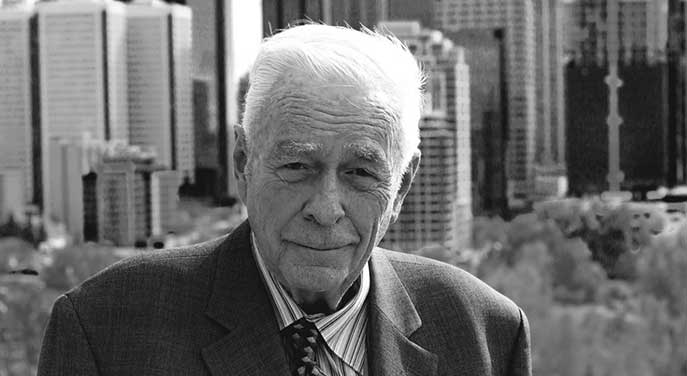 Ted Byfield passed away at his home on Dec. 23 at age 93. Many Canadian conservatives mourn the loss of a great man.
Ted Byfield passed away at his home on Dec. 23 at age 93. Many Canadian conservatives mourn the loss of a great man.
Byfield was a giant in Canadian conservatism. He consistently challenged existing orthodoxies and societal norms within modern liberalism and helped create an intellectual blueprint for a political movement that had often struggled to find its way. Many of us owe so much to him, in Western and Eastern Canada.
Hold on. The man who helped inspire the birth of the Reform Party of Canada and coined the phrase “The West Wants In” also served as a guiding light for Eastern Canadian conservatism?
Yes, indeed.
Byfield’s influential role with Western Canadian conservatives was obviously more direct and far easier to detect. Yet his equally influential role with Eastern Canadian conservatives is a fascinating part of his history that’s often forgotten or ignored.
Byfield was born in Eastern Canada – and in the heart of what became one of its most liberal cities, Toronto. His parents were Caroline and Vernon Byfield; the latter worked as a reporter for the old Toronto Telegram and the Toronto Star. Neither of his parents were particularly religious – his mother was “nominally Anglican” and his father was an “avowed atheist,” according to a 1999 Maclean’s profile by Brian Bergman.
This doesn’t mean Byfield came from prototype liberal Eastern Canadian stock.
“The Toronto of Ted’s youth,” wrote Jonathon Van Maren in his wonderful Jan. 6 obituary for Convivium, “was, he said, an ‘Anglo-Saxon town’ where Queen Victoria’s birthday was a mandatory celebration, his aunt was a member of the Imperial Order Daughters of the Empire, and the death of King George V in 1936 brought bitter tears.”
His uncle, Tommy Church, was a conservative and “renowned mayor of Toronto who served seven consecutive terms and was skewered in print by Ernest Hemingway before becoming an MP.”
In my conversations with Byfield – which were always enjoyable, but sadly few and far between – he always hoped “his Toronto” would return one day. It may have seemed like a pipe dream, but he refused to give up on what he believed in. That’s what made him so respected and admired in the Canadian conservative movement.
Byfield worked at the Ottawa Journal, the Timmins Daily Press – where he married his wife, Virginia – and the Winnipeg Free Press. They would both experience a religious conversion in 1952 after reading Christian writers like C.S. Lewis, Dorothy Sayers and G.K. Chesterton, and would remain devoted followers of the faith.
 His biggest personal and journalistic adventure was when he founded St. John’s Edmonton Report in 1973 and St. John’s Calgary Report in 1977. The two magazines were merged in 1979 to create Alberta Report. British Columbia Report and Western Report were later established.
His biggest personal and journalistic adventure was when he founded St. John’s Edmonton Report in 1973 and St. John’s Calgary Report in 1977. The two magazines were merged in 1979 to create Alberta Report. British Columbia Report and Western Report were later established.
Byfield’s Alberta Report was the Canadian equivalent of William F. Buckley’s National Review. It tackled federal and provincial politics, Western separatism, oil and energy sectors, and the rise of Reform and Preston Manning to national prominence.
Maclean’s also suggested the magazine “rarely missed an opportunity to rail against homosexuals, abortionists, human rights commissions and the public education system” and “displayed an unholy fascination with prostitution and particularly sordid murder cases.”
While those issues were certainly discussed, the analysis was much broader and more intelligent than Canadian liberals made it out to be.
All three editions were merged in 1999 into The Report (later Citizens Centre Report), a national publication. While there had been a small number of Eastern Canadian-based reporters and contributors at the magazine, as well as regular readers and subscribers, this merger helped open the door much wider. (I wrote several guest columns for Byfield’s late son, Link, who succeeded him as editor and publisher.)
The Byfield family hoped the East’s interest in conservative politics would expand in the rural areas, and possibly develop in the urban centres, if there was more exposure to the West’s conservative philosophy. In turn, magazine readership would hopefully expand and become more financially viable. While The Report broke some new ground nationally, it failed to make these crucial inroads and closed in 2003.
But its closure didn’t diminish Byfield’s legacy as a Conservative writer, publisher and thinker. He never lost his smile or zest for life. He loved to learn. He enjoyed good food and drink. He listened to other viewpoints in a respectful manner. His faith was a constant source of inspiration. He loved Virginia and his children with all his heart. And above all, he remained hopeful that Canada, East and West, would eventually find the right path.
Rest in peace, Ted – and thank you for everything.
Michael Taube, a Troy Media syndicated columnist and Washington Times contributor, was a speechwriter for former prime minister Stephen Harper. He holds a master’s degree in comparative politics from the London School of Economics. For interview requests, click here.
The opinions expressed by our columnists and contributors are theirs alone and do not inherently or expressly reflect the views of our publication.
© Troy Media
Troy Media is an editorial content provider to media outlets and its own hosted community news outlets across Canada.

